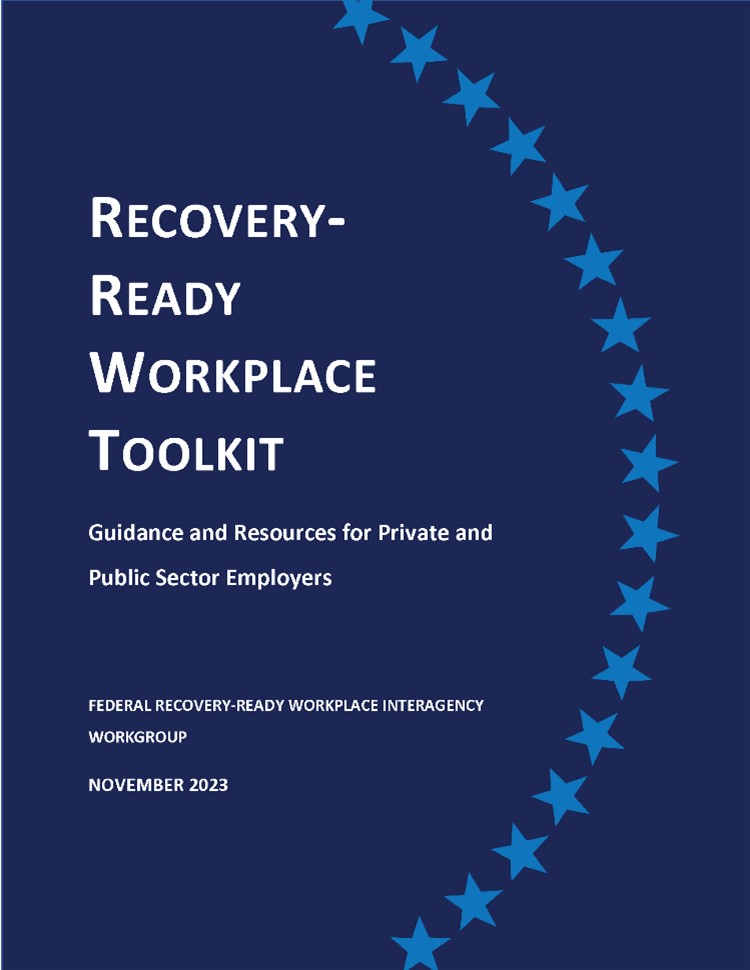ONDCP Launches New Recovery Ready Workplace Toolkit
Posted on by
In 2022, approximately 110,000 Americans died from a drug overdose. At the same time, 46 million Americans aged 18 or older experienced a substance use disorder in 2022. Nearly two thirds of those people (30.1 million) were employed. The drug overdose epidemic is occurring in and impacting workplaces. Unintentional overdose from the nonmedical use of drugs resulted in 388 worker deaths in 2020, an increase of nearly 500 percent from 2012. It is now clearer than ever that employers can play a critical role in preventing drug-related deaths and helping workers access treatment and maintain recovery from substance use disorders.

That’s why, this past November, the federal government launched a new resource to help businesses be a part of the solution. The Recovery-Ready Workplace Toolkit: Guidance and Resources for Private and Public Sector Employers was released as the newest addition to the Recovery-Ready Workplace Resource Hub, hosted by the Department of Labor’s Employment and Training Administration. The toolkit provides information, tools, and resources to help employers across all industry sectors to effectively prevent and address substance use disorders in the workforce, hire people who are in or seeking recovery, and support recovery in the workplace.
The development of the Hub and toolkit was spearheaded by the White House’s Office of National Drug Control Policy (ONDCP) and the Domestic Policy Council in collaboration with 12 federal departments and independent agencies, including NIOSH. They were developed in support of the fourth pillar of President Biden’s Unity Agenda for the Nation, addressing the opioid crisis and overdose epidemic, as well as the National Drug Control Strategy, which calls for the federal government to expand employment opportunities for people in recovery and encourage the adoption of recovery-ready workplace policies.
Recovery-ready workplace policies can provide numerous benefits including, but not limited to:
- assisting employees in pursuing and maintaining recovery;
- reducing substance-related injuries and work-related stress among employees;
- reducing absenteeism, presenteeism, lost productivity, turnover, healthcare costs, and other costs associated with substance use disorders in the workforce;
- helping retain skilled employees by providing access to treatment and a pathway to continued employment during treatment or a return to work following it; and
- increasing employee engagement and morale.
Private businesses, non-profits, unions, trade associations, and state, local, and Tribal governments have an opportunity to build a recovery-ready nation. Cultivating recovery-ready workplaces and implementing recovery-ready workplace policies can result in a healthier, more productive workforce; reduced costs to employers; stronger employment and overall economy; and a more equitable society.
NIOSH continues to partner with other federal agencies and national organizations like the National Safety Council to develop and promote the full range of resources needed to prevent overdose deaths, including those that promote and support the availability of naloxone in workplaces; reduce stigma; expand access to affordable healthcare and quality, evidence-based treatment and resources for workers with substance use disorders; eliminate barriers to employment for people in recovery; and promote workplace supported recovery.
Read more about NIOSH’s efforts to address substance use and support recovery in the workplace:
- Workplace Supported Recovery: New NIOSH Research Addresses an Evolving Crisis | Blogs | CDC
- NIEHS and NIOSH Explore the Expansion of Recovery Friendly Workplace Programs | Blogs | CDC
- NIOSH Miner Health Program Addresses Substance Use and Work | Blogs | CDC
When it comes to supporting recovery and beating the opioid crisis, businesses have a real opportunity to lead. How is your workplace striving to create a recovery-ready culture? Tell us more in the comments.
Jamie C. Osborne, MPH, CHES®, is a contractor with Advanced Technologies and Laboratories (ATL) International, Inc. serving as a Public Health Analyst with the NIOSH Office of the Director.
L. Casey Chosewood, MD, MPH, is Director of the NIOSH Office for Total Worker Health.
John Howard, MD, is the Director of the National Institute for Occupational Safety and Health (NIOSH).
Peter Gaumond is a Senior Policy Analyst with the White House Office of National Drug Control Policy (ONDCP).
Posted on by

